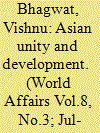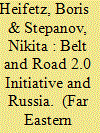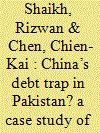| Srl | Item |
| 1 |
ID:
135541


|
|
|
|
|
| Summary/Abstract |
The winding down of colonial empires in the middle of the twentieth century was greeted by a wave of revolutionary and reformist idealism in the newly liberated countries of the third world. many international agencies and movements rose to address the inequalities and injustices inherited from the old system but a reaction from the dominant former imperial powers managed to block or reverse that evolution and establish a subtler neo-colonial exploitative regime through the mechanism of globalization enforced by the petrodollar reserve currency, major banks and multinational corporations. Today various international associations such as ALBA, ASEAN, and BRICS are developing alternatives to the hegemonic Euro-American order.
|
|
|
|
|
|
|
|
|
|
|
|
|
|
|
|
| 2 |
ID:
162061


|
|
|
| 3 |
ID:
172613


|
|
|
|
|
| Summary/Abstract |
This article analyzes the six-year period of implementation of the global Chinese project One Belt, One Road (OBOR), or the Belt and Road Initiative (BRI). Its positive aspects are highlighted: expanding the number of participants and their areas of interaction, creating a powerful financial base, creating new transborder transportation routes, increasing trade and investment among the countries participating in the project. Problems have been identified, including the lack of transparency of OBOR projects, insufficient consideration of national interests and local needs of China's partners, increasing their geopolitical risks, and the "debt trap" of Chinese loans. Possible ways of deepening the Russian-Chinese interaction at the new stage of BRI 2.0 development are proposed.
|
|
|
|
|
|
|
|
|
|
|
|
|
|
|
|
| 4 |
ID:
180679


|
|
|
|
|
| Summary/Abstract |
Existing literature on China–Pakistan trade relations mainly deals with potential opportunities for Chinese investment, while no study has so far specifically analysed Chinese investment in light of the China–Pakistan Economic Corridor (CPEC) project by taking into account how Pakistan’s domestic factors shape foreign trade relations. This article argues that the weak economic indicators of Pakistan reveal a possibility of defaulting on debt repayments, as Chinese loans have relatively high-interest rates. Through a two-level analytical framework, this article demonstrates that, despite concerns about Chinese debt traps at the international level, the CPEC project is still largely intact due to strong domestic support of the Pakistani establishment. Further, the geostrategic importance of Pakistan for China is higher than merely trade relations. It is thus also not in the interest of China to see its investments in Pakistan become a debt trap, though the institutional arrangements in Pakistan are prone to mounting debts.
|
|
|
|
|
|
|
|
|
|
|
|
|
|
|
|